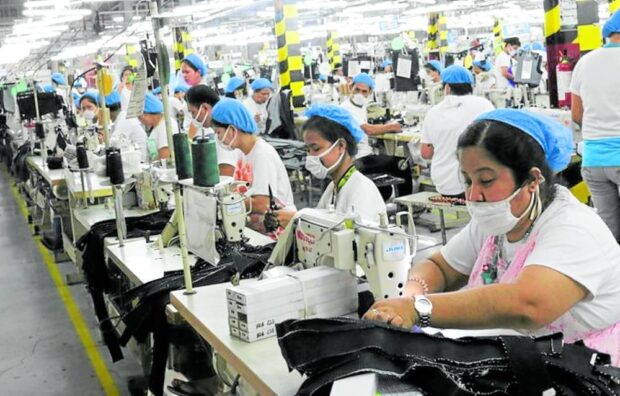
EXPORT ORDERS | Laborers are seen at work in a factory at the Mactan Export Processing Zone (MEPZ) in Lapu-Lapu City in this file photo. (Photo from the Facebook account of the MEPZ Workers Alliance)
MANILA, Philippines — The Philippines’ trade privileges with the European Union (EU) may be extended for four more years despite fears that the government’s reluctance to cooperate with the International Criminal Court (ICC) on human rights violations during the drug war may affect economic ties with the EU.
EU Ambassador Luc Veron told the Inquirer that the European Council, composed of the heads of 27 member states, has “recently proposed to roll over the current legislation until 2027.”
Veron was referring to the country’s Generalized Scheme of Preference (GSP+) privileges that are set to expire by the end of 2023.
More than 6,000 Philippine exports to the EU, such as fruits, meats, vehicle parts, and other local products, are given special incentives and zero tariffs under the GSP+. It is renewed on the condition that the Philippines adhere to EU human rights standards.
Asked whether or not plans of the government to “disengage” from the ICC in future legal proceedings will affect the GSP+, EU Ambassador to Manila Luc Veron said the two were currently “not legally tied.”
‘No legal obligation’
“There is no legal obligation under the current EU GSP+ legislation, under which trade preferences are unilaterally granted by the EU to the Philippines, related to the Rome Statute of the International Criminal Court,” Veron said in a text message on Friday.
But Trade Secretary Alfredo Pascual said last week that during his three-week visit in Europe, members of the EU said they have seen “progress” in addressing human rights concerns in the country.
The ambassador refused to comment on the plans of the government to boycott the international tribunal, saying they “highly value the independence of the International Criminal Court and of its judgments.”
Justice Secretary Jesus Crispin Remulla recently announced that the government would no longer send any legal representative to the ICC after it junked the government’s plea to stop its ongoing investigation of alleged crimes against humanity during the war on drugs waged by former President Rodrigo Duterte.
While the government is currently under no “legal obligation” to participate in the ICC to keep the GSP+, the European Council, the deciding body for the GSP+, has been critical of the human rights violations that ensued during the drug war.
Meanwhile, Senate Minority Leader Aquilino Pimentel III said the Philippines should brace for the possible repercussions of President Ferdinand Marcos Jr.’s order for the country to “fully disengage” from the ICC following its decision to pursue the investigation of Duterte’s war on drugs.